Though few would dispute that breast milk is better for babies than formula, the sharing of breast milk, an age-old practice, is a lightning rod for negative criticism – criticism not so very dissimilar from that incurred by breastfeeding itself sixty odd years ago. But while we now know and accept that breastfeeding is important and should be encouraged, sharing breast milk remains a largely western taboo.
Ideally, of course, all mothers would receive the practical, cultural, and institutional support they need to breastfeed on their own. But for women who are passionate about offering their babies nature’s first food, but find for a variety of reasons they are unable to breastfeed, searching for a secondary source makes lots of sense. These moms want to provide the most nutritious and biologically appropriate food for their children; that is, breast milk with its many ingredients and live structures that are impossible to replicate.
Indeed, both the American Academy of Pediatrics and the the World Health Organization (WHO) recommend exclusive breastfeeding for at least six months, and thereafter in combination with food. Interestingly, WHO specify that best alternative to a mother’s milk is breast milk from a wet nurse.
It seems more than time that we should reevaluate the benefits of sharing breast milk.
An ancient practice
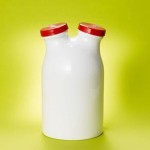 In many village communities in Africa and the Islamic world, nursing the baby of a friend or relative has always been considered good manners. In Europe, hiring a wet nurse became standard practice for royalty and aristocracy by the Middle Ages. By the 19th century even the middle class used wet nurses. Madame Bovary, the Victorian title character of Flaubert’s novel, and the wife of a doctor, sent her baby to a wet nurse as a matter of course.
In many village communities in Africa and the Islamic world, nursing the baby of a friend or relative has always been considered good manners. In Europe, hiring a wet nurse became standard practice for royalty and aristocracy by the Middle Ages. By the 19th century even the middle class used wet nurses. Madame Bovary, the Victorian title character of Flaubert’s novel, and the wife of a doctor, sent her baby to a wet nurse as a matter of course.
The practice of sharing milk only really declined significantly in the West in the 20th century as a result of aggressive marketing campaigns for infant formula rose across the globe.
A dangerous practice?
In a Baby Talk poll, 45% said that cross nursing was “disgusting” or “weird.” Sharing breast milk incites a strong visceral reaction among many people. And it is certainly true that nursing a baby is an intimate act, and sharing milk needs to be done responsibly.
But our mainstream society has no problem with babies ingesting formula based on cow’s milk, which can include additives, preservatives, and unsafe chemicals, such as bovine growth hormone and perchlorate. We know nothing about the treatment or feeding of the cows or the process by which their milk is extracted. On top of this, numerous studies, show that formula-fed children have higher rates of cancer, obesity, inflammatory bowel disease, SIDS, respiratory infections and allergies, among other negative conditions.
In contrast, organizations such as Human Milk 4 Human Babies provide a forum for families to connect with women who have an excess of ‘liquid gold’ and want to share it out of altruism. This peer-to-peer approach means that milk is available for more babies than milk banks can cover, which primarily serve premature and sick infants. Milk banks can be expensive, whereas HM4HB prohibits the sale of breast milk. Donors often make physician reports and blood work results available to recipient families. Milk sharing families can even end up by discussing parenting philosophies — they get to know each other well.
Milk sharing occurs in a community context. Relationships are paramount, and donors and recipients are able to interact directly with one another, ask questions, and participate in reciprocal disclosure.
A growing practice
Breast milk sharing is becoming increasingly popular with families who have thoughtfully weighed the pros and cons of milk sharing and formula feeding, as can be seen by HM4HB’s 52,800 members. These informed families don’t need to have milk sharing regulated by governments, but would welcome establishing safety procedures for peer-to-peer milk sharing practices so that any potential risks could be almost completely eliminated.
It is time for us to support families who want the best for their children and feel that milk sharing is the right place to start.
 Rebecca McCloskey, MSW, LCSW is a Specialist Professor at Monmouth University. She received her master’s degree in social work from The Ohio State University. Rebecca has spent her professional career working with children diagnosed with chronic and life-threatening illness, developmental delays, and disabilities. She has experience providing case management, advocacy services, and individual and group counseling with children and their families. Her current areas of practice and activism include maternal mental health, human rights related to childbirth and breastfeeding, and breast milk sharing.
Rebecca McCloskey, MSW, LCSW is a Specialist Professor at Monmouth University. She received her master’s degree in social work from The Ohio State University. Rebecca has spent her professional career working with children diagnosed with chronic and life-threatening illness, developmental delays, and disabilities. She has experience providing case management, advocacy services, and individual and group counseling with children and their families. Her current areas of practice and activism include maternal mental health, human rights related to childbirth and breastfeeding, and breast milk sharing.
References
- Akre, J. E., Gribble, K. D., & Minchin, M. (2011). Milk sharing: from private practice to public pursuit. International Breastfeeding Journal, 6 (8).
- Centers for Disease Control and Prevention. Breastfeeding Report Card—United States, 2014.
- Gribble, K. D. (2012). Biomedical Ethics and Peer to Peer Milk Sharing. Clinical Lactation, 3 (3), 109-111. Retrieved at:
- Gribble, K. D., Hausman, B. L. (2012). Milk sharing and formula feeding: Infant feeding risks in comparative perspective? Australasian Medical Journal, 5 (5), 275-283.
- Human Milk 4 Human Babies
- Keim, S. A., Hogan, J. S., McNamara, K. A., Gudimetla, V., Dillon, C. E., Kwiek, J. J., & Geraghty, S. R. (2013). Microbial contamination of human milk purchased via the Internet. Pediatrics, 132(5), e1227-e1235.
- NJ Assembly Bill A1857, 2014-2015 Ref. Sess.
- Weimer, J. (2001). The economic benefits of breastfeeding: A review and analysis. Food Assistance & Nutrition Research Report No. 13. Wash. D.C., USDA.
Photo credits:
Breastfeeding baby: Gagliardi Photography
Milk bottle: Spencer Jones and Parenting.com

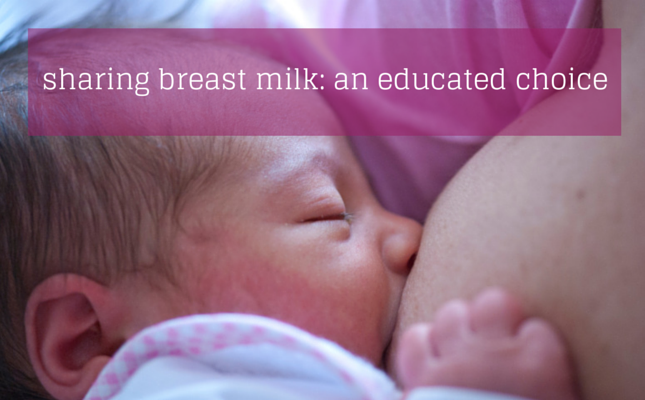





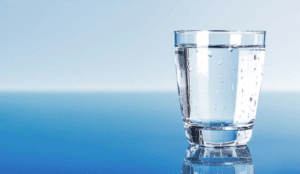

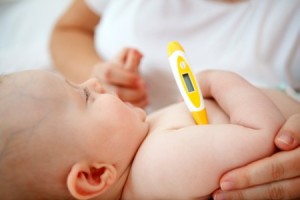
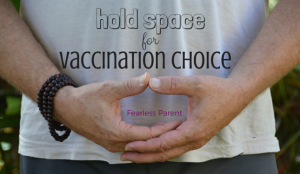

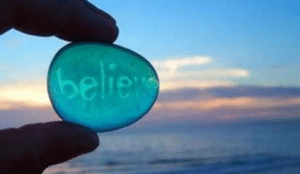
Such a precious gift to another lil person!
I’m very thankful for all the donors my daughter has received milk from and would hate for the government to get involved in this.
People should always be provided with accurate information and then left to decide for themselves what works best (as far as law and government).
As mammals, we all desire the very best for our children and I think that would be reflected in our choices if given the opportunity.
Reading a bit about wet nursing:
It was prevalent in the US (all social ranks) for most of our history. It was the way babies survived. In England, most wet nurses were single women with illegitimate children working for (and living with) a wealthy family. She often sacrificed her own baby who was typically bottle-fed (many did not survive).
Wet nursing started to decline in England in the mid 19th century when MEDICAL JOURNALISTS started circulating UNDOCUMENTED dangers of the practice, making emotional arguments about the physical and moral risks, and accusing wet nurses of evil acts.
The world’s first baby formula was invented in 1867.
Gee, what a surprise.